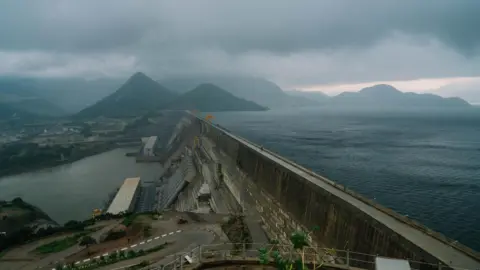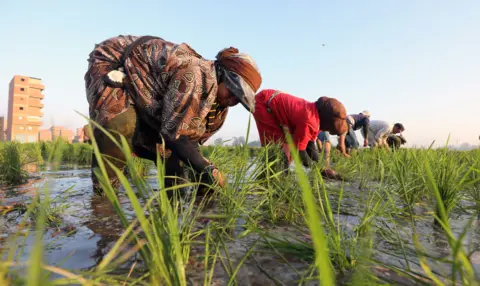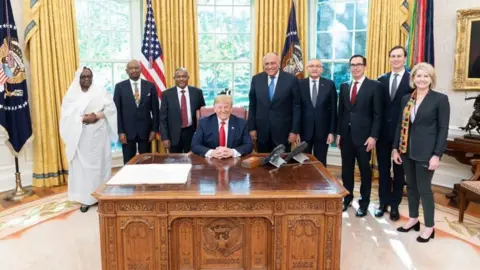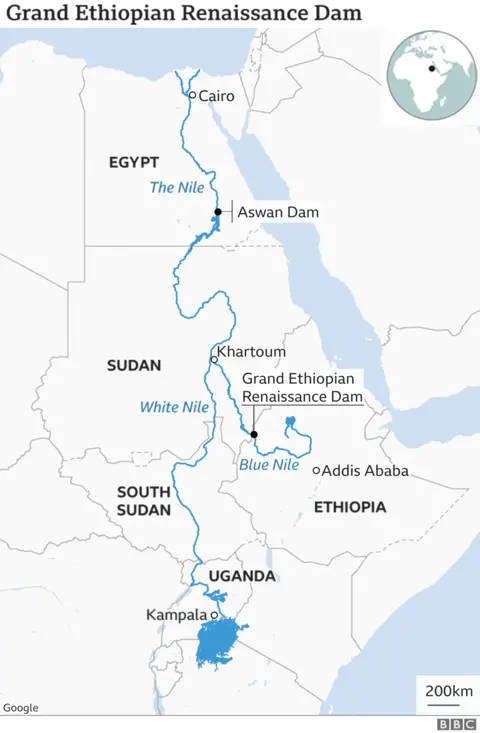Farouk Chothia and Yemen NagishBBC News and BBC Tigrina
 AFP/Getty Images
AFP/Getty ImagesAfter Egypt’s dismantling on the diplomatic theater for more than a decade, Ethiopia is scheduled to be officially separated by one of the largest dams in the world on the tributaries of the river, and buried a treaty in the colonial era that witnessed that the United Kingdom guarantees the northern African nation the lion’s share of its waters.
The dam – which was built on the Blue Nile at a cost of about $ 5 billion (3.7 billion pounds), with almost a tank of the size of Greater London – led to an increase in Ethiopian nationalism, often unifying a nation along the ethnic lines and rose in the conflict.
“Ethiopians may differ from how to take bodies [their staple food]”They agree on the dam,” Moussa Krispeus Okelo, an analyst at the Institute of Security Studies in South Africa for security studies, told the BBC.
“They do not see it as a pile of concrete in the middle of the river, but as a memorial to accomplish them because the Ethiopians, at home and in the diaspora, funded the construction of the dam. There were waves and waves of appeal for contributions when construction began in 2011.
“The government also issued bonds bought by companies and workers. So, the feeling that all Ethiopians have the dam greatly grown, and installed a great source of pride for the nation,” said Mr. Oblo.
The analyst added that the Green Ethiopian Renaissance Dam, the largest electricity factory in Africa, which raises hopes that will not meet the energy needs of 135 million people, but also give the country “energy dominance” and enhance foreign currency profits.
He said that Ethiopia plans to increase the sale of electricity to neighboring countries such as Kenya and Djibouti, with the aspirations of building a transport network for the Red Sea for sale to the Middle East states such as Saudi Arabia.
 The Office of the Prime Minister of Ethiopia
The Office of the Prime Minister of EthiopiaBut for Egypt, the dam is the opposite of the hopes and aspirations of Ethiopia.
It is afraid that the dam sharply reduces the flow of water to the country, causing water shortages.
“About 93 % of Egypt is desert, with almost no people. We all, 107 million people, live on the Nile,” Professor Abbas Sharaki, Professor, Professor, Professor Sharaki, told the BBC.
“The Egyptian civilization was built on the Nile. The Nile is our life,” he added.
The academic warns that “water poverty” can get worse in Egypt because of the dam.
Professor Sharaki said: “It stores 64 billion cubic meters, from water that usually flows to Egypt. This is a very great loss for us. Our average annual share is 55.5 billion cubic meters. We have no other source of water, but the Nile.”
He added that the GERD stores “about the weak amount of water in the three Gorges Dam in China, which is the largest dam in the world to generate electricity.”
A former negotiator for Ethiopia because of the reflux of the esophagus, Fukaid Nigash, told the BBC that despite the massive diplomatic pressure and even the threats of war from Egypt, Ethiopia was stuck with its plan to build the dam because it was vital for its development needs.
This includes providing electricity to an estimated 60 % of the Ethiopians who cannot reach it, yet he indicated that this will not be easy as a transportation network must be built across the vast country with rock terrain and mountains.
 EPA
EPAProfessor Sharaki said that although the Blue Nile was a “international river”, Ethiopia made a decision “unilaterally” to build the dam – which he succeeded in doing only because Egypt had a revolution at the time, which led to the overthrow of the long -awaited ruler Hosni Mubarak.
He said: “Egypt was in a very bad situation, without a president, and our army was busy inside the country,” adding that the state of North Africa has now taken steps to find alternative sources of water – including building the largest water treatment plant in the world, and dug more than 5,000 wells.
The academic said that Egypt has also forced changes to the agricultural sector – for example, by limiting the region to grow the intense water rice, from about two million acres to one million acres.
“If you store 64 billion cubic meters of water that was flowing to Egypt, would it not cause harm?” Professor Sharaki, and rejected the allegations of Ethiopia that the state of North Africa will not be negatively affected by the dam.
Mr. Fekahmed BBC told Ethiopia not to return to the afternoon when Egypt was guaranteed to a specific amount of water, but it was “always open to talks related to the release of water and the safety of the dam.”
Rashid Abd, an analyst at the Kenya -based Sahan Research Research Center, said that the completion of GERD preached the end of the British deal – the colonial power at the time – in the twenties of the twentieth century to ensure Egypt is about 80 % of the Nile water.
“This has done Britain to purify Egypt and secure its own interests because Egypt is a strategic state that controls the Suez Canal, a gateway to Europe,” Mr. Abedi told the BBC.
“But Ethiopia is now expecting power, while Egypt’s fortunes have decreased. It has lost its distinguished situation on the Nile,” he said.
 White House via Realdonaldtrump
White House via RealdonaldtrumpIn what Mr. Okello described it as a “political blow”, the Ethiopia Minister Melis Zenawi announced in 2011 in 2011 planning to build what was called the “project X”, which raises an operation that led to Egypt’s loss of “veto” on the use of the Nile water.
“Egypt has pressed on a large scale to institutions such as the World Bank not to finance the construction of the dam. This is just enhancing the determination of the Ethiopian government, and began a major campaign to raise funds from its citizens,” he said.
So Ethiopia got money from different local sources, as well as a small contribution from IGAD [East Africa’s regional bloc, the Intergovernmental Authority on Development]. If you get money from other sources as well, it is not talking about it loudly. “
US President Donald Trump claimed that the United States was “funded by” stupidity “by building the dam, and that it” largely “reduces the water flowing to the Nile, echoing Egypt’s anxiety – a strong American ally.
Ethiopia rejected its demand that it was “wrong”, Insist that the dam was self -funded.
Mr. Ozlo said that Trump tried to mediate in a deal on the dam during his first term, but during the era of Prime Minister Abi Ahmed, who won the Nobel Peace Prize to end hostile works with Eritrea – he moved away when he felt that the American president was standing with Egypt.
Mr. Osilo said: “Trump was weak.
 The Office of the Prime Minister of Ethiopia
The Office of the Prime Minister of EthiopiaBefore the inauguration of Chadd on Tuesday, the Minister of Foreign Affairs in Egypt, Badr Abdati, rose his government’s speech against the dam, saying that the water security was a “red line” and that the dam was a “existential threat” to the state of North Africa.
However, Professor Sharaki excluded the possibility of Egypt’s war with Ethiopia.
“They are our brothers. We drink from the same water. The Nile is coming from them,” he said, adding that Egypt will continue to try to resolve the conflict through negotiations.
Mr. Fekahmed said that Egypt could not resort to the bombing of the esophagus because it will be a “suicide bomber” of the country – as well as Sudan, which borders Ethiopia – because all dam water will start and “destroy” the two countries.
The Egyptian geology expressed his fear that Ethiopia could use the dam to practice “military power”, especially on Sudan – a strategic important ally of Egypt – where the Blue Nile and the White Nile meet in Khartoum.
Professor Sharaki said: “If there is tension or conflict between Ethiopia and Sudan, then Ethiopia can destroy Sudan through this dam, without weapons or aircraft.”
It also worried that the reflux of the esophagus would return to start a “new earthquake” system.
Professor Sharaki said: “If you store 64 billion cubic meters of water, this means 64 billion tons of weight in an area with volcanic rocks, a lot of fractures, and the largest disagreement in the world, East Africa’s crack, which is an active crack.”
Ethiopia has already said that studies have shown that Egypt’s fears are unfounded, and the dam is far from earthquakes.
Therefore, the Ethiopians are unlikely to leave Egypt mixing their mood while preparing to celebrate the opening of the dam and focus on their next goal – to restore access to the Red Sea, which Ethiopia lost when Eritrea gained independence in 1991.
Last week, the Ethiopian Prime Minister said that giving up the Red Sea was “a mistake that will be corrected tomorrow.”
Abi added: “The issue of the marine port is no longer something that is not ashamed of. The global perspective is clear – there is no big country without reaching the ports, and this must be dealt with through negotiation.”
Eritrea rejected his comments as “a reckless screaming”, amid fears that relations between the two countries – which fought a border war killed tens of thousand people in the late 1990s – were deteriorating again.
Mr. Oblo said that the national enthusiasm between the Ethiopians on the dam was seen in the Red Sea campaign.
“Ethiopia built the dam, despite the difficulties,” he said.
“She now wants to reach the sea, build a marine force. It is not clear how it will do, but Ethiopia sees itself as a great nation, and there are not many great countries that suffer from it.”

More about the Ethiopian dam:
 Getty Images/BBC
Getty Images/BBC
https://ichef.bbci.co.uk/news/1024/branded_news/7a0b/live/284e8480-88c3-11f0-b391-6936825093bd.jpg
2025-09-07 00:05:00














